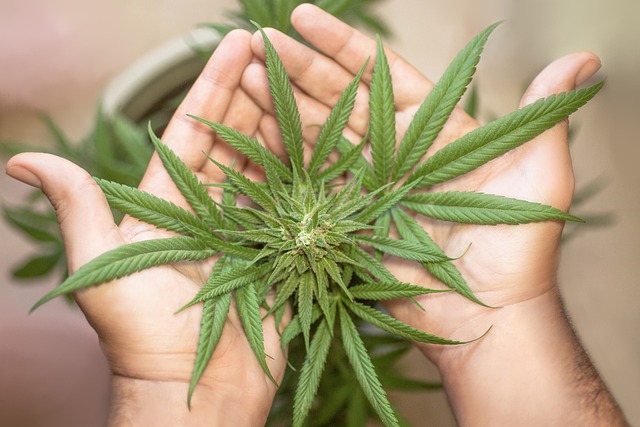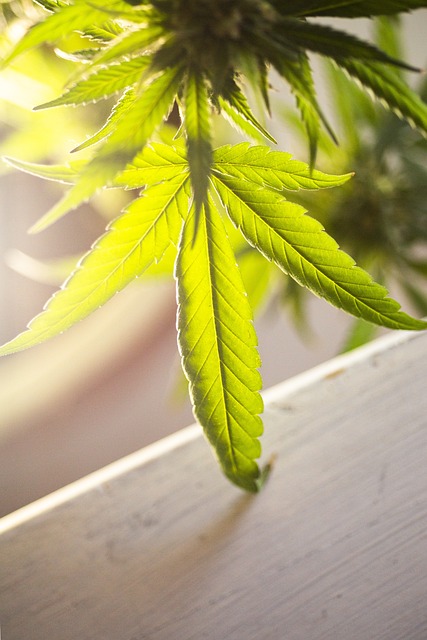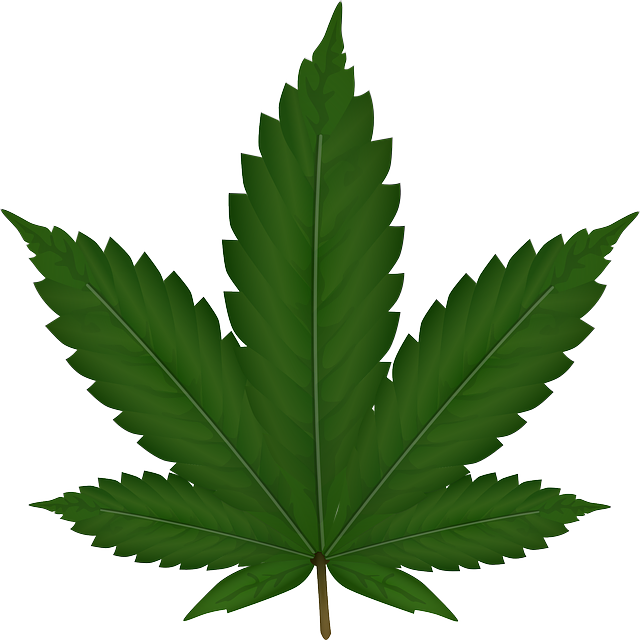Delta-9 tetrahydrocannabinolic acid (THCA), a non-psychoactive cannabinoid found in cannabis, has garnered attention for its potential health benefits, including anti-inflammatory and neuroprotective properties. As of 2023, THCA's legal status in Indiana allows for its use under medical regulations, specifically for conditions like chronic pain, arthritis, multiple sclerosis, and neurological disorders. While the sale and possession of raw THCA are not explicitly permitted by state law, hemp-derived products with less than 0.3% THC on a dry weight basis, including THCA-rich products, are legal under the 2018 Farm Bill. Indiana's approach to THCA reflects a careful balance between access to potential therapeutic compounds and regulatory compliance, with ongoing research expected to further clarify its benefits and appropriate uses within medical protocols. Consumers interested in the health advantages of THCA are advised to seek out reliable sources for products that comply with state and federal laws. The entourage effect, a phenomenon where cannabinoids and terpenes work synergistically, is particularly relevant when considering full-spectrum hemp products containing THCA flower for a more potent therapeutic experience.
Explore the transformative potential of THCA-rich flowers within the realms of health and wellness. This article delves into the multifaceted benefits of THCA, from its therapeutic properties to its role in full-spectrum hemp products. We’ll shed light on the legality of THCA in Indiana, providing clarity on its status under state regulations. With a focus on the science that sets THCA apart from other cannabinoids, we’ll uncover how this non-psychoactive compound could revolutionize skincare and acne treatment, offer relief for those with inflammatory conditions or pain, and serve as an antiemetic aid for chemotherapy patients. Indiana’s unique agricultural landscape offers a backdrop for cultivating these beneficial flowers. As we navigate through the emerging research and consumption methods, we’ll also address dosage and safety to ensure responsible use. Join us as we explore the future of THCA research and its implications for the burgeoning market in Indiana.
- THCA Flower Benefits Unveiled: A Comprehensive Overview
- Understanding THCA: The Cannabinoid at the Heart of Controversy and Health Potential
- THCA Legal Status in Indiana: Navigating State Regulations and Legality
- The Science Behind THCA: How It Differs from Other Cannabinoids
- Potential Therapeutic Properties of THCA Flower
- Analyzing the Entourage Effect: THCA Flower's Role in Full-Spectrum Hemp Products
THCA Flower Benefits Unveiled: A Comprehensive Overview

Delta-9 tetrahydrocannabinol (THC) is well-known for its psychoactive properties, but another cannabinoid, tetrahydrocannabinolic acid (THCA), is gaining attention for its potential health benefits. THCA is the raw, non-psychoactive precursor to THC and is found in raw marijuana flowers or concentrated preparations. As of the knowledge cutoff in 2023, THCA’s legal status in Indiana aligns with the state’s broader cannabis laws, which allow for the use of cannabidiol (CBD) and certain other low-THC products for medical purposes. In this context, THCA flower benefits are being explored for their therapeutic potential without the psychoactive effects associated with THC.
Research suggests that THCA may have anti-inflammatory, neuroprotective, and analgesic properties, making it a subject of interest in various medical applications. Indiana residents who are eligible for medical cannabis may find THCA flower beneficial for conditions like chronic pain, inflammation related to arthritis, multiple sclerosis, and other neurological disorders due to its potential to alleviate symptoms without the mind-altering effects of THC. Additionally, studies indicate that THCA might offer neuroprotective benefits, which could be significant for individuals with neurodegenerative diseases. As with any medical treatment or supplement, it is advisable for patients to consult with healthcare professionals before incorporating THCA flower into their regimen, especially considering the evolving legal landscape and scientific understanding of its effects.
Understanding THCA: The Cannabinoid at the Heart of Controversy and Health Potential

THCA, or Tetrahydrocannabinolic Acid, is a cannabinoid found in the cannabis plant that has garnered attention for its potential health benefits and its role in the broader cannabinoid landscape. Unlike its more famous counterpart, THC (Tetrahydrocannabinol), THCA is non-psychoactive, meaning it does not induce the ‘high’ commonly associated with cannabis consumption. This distinction has led to a growing interest in the therapeutic properties of THCA, which include anti-inflammatory, neuroprotective, and potential anti-cancer effects, as evidenced by various preclinical studies.
In terms of legal status, the landscape for THCA-rich products varies across different regions. In Indiana, for instance, the legalities surrounding THCA are subject to the state’s broader cannabis laws. As of the knowledge cutoff in 2023, Indiana has authorized the use of CBD (Cannabidiol) with a low THC content for certain medical conditions under a specific regulatory framework. However, the sale and possession of products containing raw cannabis flowers or other forms of THCA, even if non-psychoactive, may not be explicitly allowed under state law. This legal ambiguity often leads to a cautious approach among consumers and retailers in Indiana, highlighting the importance of staying informed about the evolving regulations governing cannabinoids. Consumers interested in exploring THCA’s benefits should first consult with healthcare professionals and understand the legalities within their jurisdiction before use.
THCA Legal Status in Indiana: Navigating State Regulations and Legality

In Indiana, the legal landscape concerning cannabinoids such as THCA is distinct from those containing THC (tetrahydrocannabinol). THCA, or tetrahydrocannabinolic acid, is a non-psychoactive precursor to THC found in raw cannabis plants. As of the latest updates, state regulations allow for the sale and use of products derived from hemp, providing they contain less than 0.3% THC on a dry weight basis, under the 2018 Farm Bill federal legislation and Indiana’s own hemp laws. This has led to a market where THCA-rich products, often in the form of flowers or extracts, can be legally sold and possessed so long as they meet the regulatory criteria set forth by both federal and state regulations. However, it’s crucial for consumers and retailers to remain aware of these thresholds to ensure compliance with the law. Indiana’s approach to THCA is a reflection of its broader policy towards cannabis-related substances, which emphasizes distinction based on psychoactivity and legality within the confines of hemp regulations. Users interested in the benefits of THCA flowers should seek out reputable sources that provide clear lab results confirming the THC content to remain within legal limits.
The Science Behind THCA: How It Differs from Other Cannabinoids

Delta-9-tetrahydrocannabinolic acid (THCA) is a cannabinoid found naturally in the Cannabis sativa plant, which also contains other well-known cannabinoids such as delta-9-tetrahydrocannabinol (THC) and cannabidiol (CBD). While THCA is non-psychoactive, unlike its isomer THC, it holds potential therapeutic benefits that are distinct from those of its counterparts. Research indicates that THCA interacts with the body’s endocannabinoid system through its affinity for the CB1 and CB2 receptors, potentially offering anti-inflammatory, neuroprotective, and analgesic effects without the psychoactive side effects associated with THC.
The legal landscape regarding cannabis and its derivatives varies across different states in the U.S., including Indiana. As of the knowledge cutoff date, THCA is legal in Indiana under certain conditions, particularly for medical purposes as per the state’s regulations. This legality allows for research and the exploration of THCA’s benefits, contributing to a growing body of scientific literature that investigates its potential roles in treating various health conditions. In this context, it is crucial for consumers and healthcare providers to stay informed about the evolving legal status and scientific understanding of THCA and other cannabinoids to make informed decisions regarding their use and applications.
Potential Therapeutic Properties of THCA Flower

The potential therapeutic properties of THCA flower, or tetrahydrocannabinolic acid, have garnered significant attention within scientific and medical communities. Unlike its psychoactive counterpart THC, THCA is non-psychoactive, making it an appealing option for those seeking the health benefits associated with cannabis without the high. Preliminary research suggests that THCA may offer a range of therapeutic effects, including anti-inflammatory and neuroprotective properties. It is believed to interact with the body’s endocannabinoid system, which plays a role in regulating various physiological processes, potentially providing relief from symptoms associated with conditions such as chronic pain, inflammation, and neurological disorders.
In states like Indiana, where the legal status of THCA flower is being re-evaluated, there is growing interest in its potential benefits. As of my knowledge cutoff in early 2023, certain forms of cannabis with low THC content are legal for medical purposes in Indiana, provided they meet specific state regulations. This has opened the door for research and exploration into how THCA could be utilized within the state’s medical framework. Patients and researchers alike are keen to understand more about how THCA interacts with the human body and its potential therapeutic applications, especially given its non-psychoactive nature, which could make it a safer option for those sensitive to the effects of THC. As such, the study of THCA flower’s benefits continues to be an area of active investigation, with promising indications that warrant further scientific inquiry.
Analyzing the Entourage Effect: THCA Flower's Role in Full-Spectrum Hemp Products

In recent years, the scientific community has been scrutinizing the complex interplay of cannabinoids and terpenes within hemp products, a phenomenon known as the entourage effect. This concept refers to the collaborative synergy between different compounds found in cannabis, including Tetrahydrocannabinolic Acid (THCA) and others like CBD and CBN, which when combined, may offer a more potent therapeutic benefit than any single compound alone. THCA, in particular, is non-psychoactive, making it an appealing option for consumers looking to experience the potential wellness benefits without the psychoactive effects associated with its counterpart, THC. For those interested in the legality of THCA products, it’s worth noting that as of the latest regulations, THCA is legal in Indiana when derived from hemp compliant with the 2018 Farm Bill, provided it contains less than 0.3% delta-9-THC.
The role of THCA flower in full-spectrum hemp products is pivotal in harnessing the entourage effect. THCA flowers contain high concentrations of this cannabinoid and are often utilized for their potential health benefits, which include anti-inflammatory and analgesic properties. Consumers seeking the complete range of cannabinoids and terpenes present in the hemp plant may choose full-spectrum products containing THCA flowers. These consumers can benefit from a broader spectrum of compounds that may work synergistically to produce a more effective and holistic experience than isolated or broad-spectrum alternatives. As such, the inclusion of THCA flower in full-spectrum hemp products is a testament to the growing understanding and appreciation of the entourage effect’s significance in the cannabinoid realm.
THCA, or Tetrahydrocannabinolic Acid, has emerged from the shadows of its psychoactive counterpart, THC, to garner attention for its potential therapeutic benefits and unique role within hemp products. This article has delved into the multifaceted nature of THCA, shedding light on its legal status in Indiana, where it remains a subject of regulation and debate. The scientific exploration of THCA’s distinct properties reveals a cannabinoid with promising health implications, particularly for those seeking relief from various ailments without psychotropic effects. As the legal landscape evolves and research continues to unfold, the entourage effect’s significance in full-spectrum hemp products highlights the importance of understanding THCA’s role within this complex plant chemistry. For those in Indiana looking to explore THCA legality and its potential benefits, a well-informed approach is key, as the cannabinoid landscape continues to evolve.
